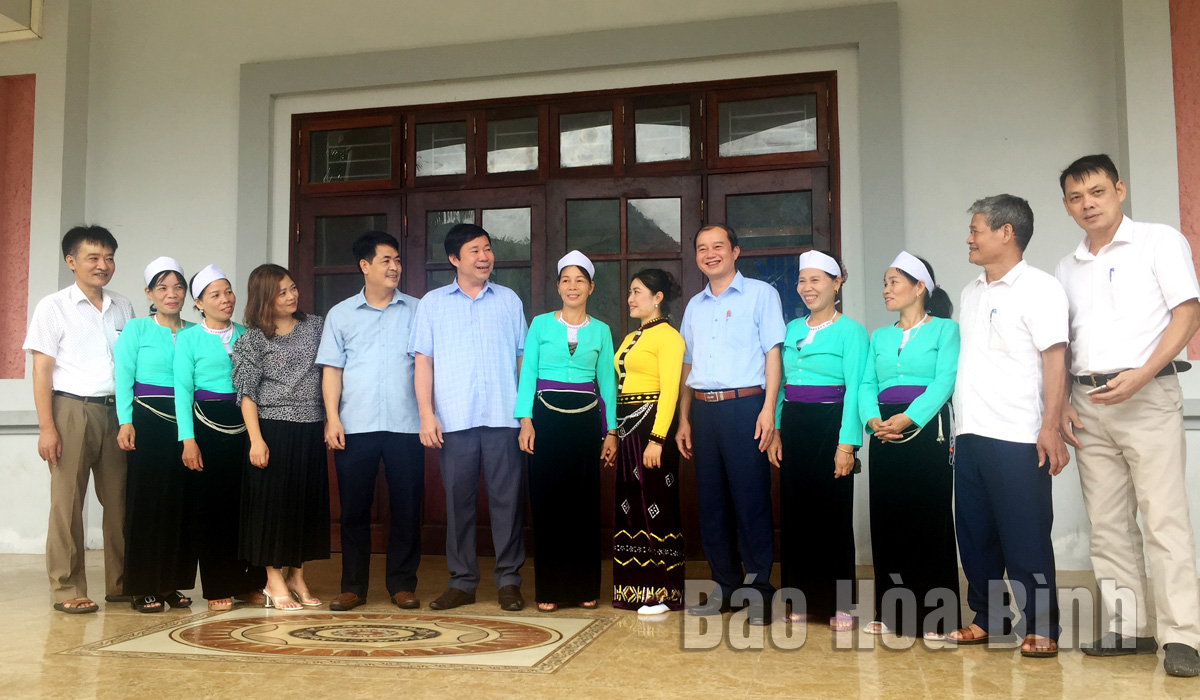
(HBO) – The Hoa Binh hydropower plant is considered a brilliant example of the Vietnamese people’s bravery, creativity and industriousness to weather every difficulty and challenge, and forever a pride of the country. The plant construction was carried out smoothly partly thanks to the particularly enormous contributions by people of different ethnic groups in Da Bac district.
Leaders of the Party Committee and People’s Committee of Da Bac district talk to residents in the communes near the Da River reservoir.
In a recent interview granted to the Hoa Binh Newspaper on the occasion of 40 years since the relocation of residents to serve the plant construction, Bui Van Luyen, member of the Hoa Binh provincial Party Committee, Secretary of the Party Committee and Chairman of the People’s Council of Da Bac district, said until now, the resettlement to serve the building of the Hoa Binh hydropower plant remains the largest of its kind in Vietnam in the post-war period.
Da Bac was considered the centre of that resettlement since most of local residents lived near the old National Highway 6 that ran along the Da River. At that time, 18 of its 23 communes were located on the banks of this river, and seven had to completely move out of the area zoned for the plant’s reservoir.
From 1982 to 1986, the district completed the relocation of 2,365 households with 12,397 people, 3,700 graves and tens of thousands of square metres of housing in 60 villages in 18 of the 23 communes. The task was carried out swiftly with high consensus from locals, which was thanks to communications activities and leading good examples by cadres and Party members in following the Party and Government’s resettlement policy. It is noteworthy that the State almost didn’t have to pay compensation for site clearance but only needed to offer small aid, according to the official.
He went on to say that after 40 years, it could not be said that local residents have been completely free of hardships, but thanks to efforts, consensus and solidarity of the district’s Party organisation, administration and people, Da Bac has enjoyed stable socio-economic development.
So far, all communes have had concrete and asphalt roads reaching their centres while over 70% of irrigation canals and ditches have been concretised. The annual per capita income has risen to 29.8 million VND (nearly 1,300 USD). Four communes in the district have been recognised as new-style rural areas, five residential areas as role models, and six products rated three - four stars under the One Commune, One Product (OCOP) programme.
The district has also invested resources in educational development and now has 25 of the 47 schools (accounting for 53%) meeting national standards. The grassroots healthcare network has continued to be upgraded to meet people’s demand for medical examination and treatment. Meanwhile, health insurance has covered more than 95% of the local population.
Authorities have also paid attention to caring for disadvantaged people and families of revolution contributors, effectively carried out the policy for ethnic minorities and the national target programmes, and guaranteed political security and social order and safety. Much improvement has also been recorded in the building of the Party, administration, Vietnam Fatherland Front and organisations, Luyen said.
In recognition of those achievements, on the occasion of 40 years since the resettlement of residents in the Da River reservoir, the Party organisation, administration and people of Da Bac have been rewarded with the third-class Labour Order by the State President.
This reward is a demonstration of the unceasing efforts by the district’s Party organisation, administration and people of all ethnic groups over the past years, the Chairman added./.
The Standing Board of the Hoa Binh provincial Party Committee has agreed in principle on a proposal by the Standing Board of the Party Committee of Hoa Binh city to gather feedback on the city’s 1:2000 zoning plan, which forms part of its broader urban development strategy.
Hoa Binh province has made notable progress in public administration reform and digital government development, with the satisfaction index among citizens and businesses reaching over 84%, according to recent government evaluations.
Thanks to great efforts by local authorities in recent times, the governance and public administration performance of Mai Chau district has been significantly improved.
In the afternoon of June 6, the Party Committee, the People's Council, the People's Committee and the Fatherland Front of Lac Son district solemnly held a meeting to celebrate the 139th anniversary of the district's founding (1886–2025) and the 79th anniversary of the establishment of the district's Party Committee (1946–2025). There was the attendance of Mr. Bui Van Thang, the Vice Chairman of the Provincial People's Council; Mr. Quach Tat Liem, the Vice Chairman of the Provincial People's Committee; Ms. Dang Bich Ngoc, the Deputy Head of the National Assembly Delegation of the province; as well as the former leaders of the province and district through various periods, who are the natives of the district.
Implementing the Politburo’s Resolution No. 57-NQ/TW on breakthroughs in science – technology, innovation, and digital transformation is a golden opportunity for the northern mountainous province of Hoa Binh to renew growth model, improve competitive edge and shorten digital gap.
Resolution 57-NQ/TW, issued by the Politburo on December 22, 2024, identifies sci-tech, innovation, and digital transformation as strategic breakthroughs to build a developed and prosperous nation. In Hoa Binh province, this spirit is not just a slogan, it’s being put into action through concrete initiatives that form a "new development triangle”: digital citizenship, digital economy, and digital administration.



